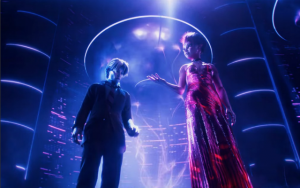READY PLAYER ONE: 3 STARS. “Spielberg seems to love spectacle over story.”
 In brand crazy Hollywood “Ready Player One,” the new sci fi film from Steven Spielberg, is an everything-old-is-new-again hybrid. Based on the novel of the same name from author Ernest Cline it’s not a reboot or reimagining of a comic book or old film. It’s an original story that may appeal to folks who say the movies only recycle ideas. At the same time it’s stuffed to the gills with enough pop culture icons to warm the hearts of any nostalgic moviegoer.
In brand crazy Hollywood “Ready Player One,” the new sci fi film from Steven Spielberg, is an everything-old-is-new-again hybrid. Based on the novel of the same name from author Ernest Cline it’s not a reboot or reimagining of a comic book or old film. It’s an original story that may appeal to folks who say the movies only recycle ideas. At the same time it’s stuffed to the gills with enough pop culture icons to warm the hearts of any nostalgic moviegoer.
It’s 2045 and the world is a mess. Cities are a hodgepodge of dystopian horrors, overcrowded, polluted and corrupt. For the people, whatever joy can be mined from the desolate, depressing life comes from immersing themselves in a virtual reality world called OASIS (Ontologically Anthropocentric Sensory Immersive Simulation). “Except for eating, sleeping and bathroom breaks,” says Wade Watts (Tye Sheridan), “everyone does everything in the OASIS.” Based on 1980s movies, pop culture and videogames, it’s a technological escape from the all-too-real societal ills that make life miserable. “These days reality,” Wade says, “is a bummer.”
When OASIS creator James Halliday (Mark Rylance) died he created a way for Watts and his on-line Gunter pals—egg hunters—to find a way out of their IRL problems. The creator left behind an Easter Egg—if you don’t know that an Easter Egg is a hidden game message or image, give up now—amongst the game’s familiar pop culture characters. Whoever finds the three keys that unlock the Easter Egg will inherit the OASIS empire. Money, power, the whole nine yards. Watts, who lives in a vertical trailer park called The Stacks in Columbus, Ohio, along with his digital team the High Five, work to navigate the game and change their lives. In a race against time, they must beat the Sixers, an army of gamers employed by evil corporation Innovative Online Industries, in a war for control of the future.
Think your kids spend too much time playing video games? Get a load of Wade, Art3mis (Olivia Cooke), Aech (Lena Waithe), Daito (Win Morisaki) and Shoto (Philip Zhao). This crowd are best friends, although for most of the movie they have never met on terra ferma. They spend all their time on line, forming friendships, falling in love and eventually fighting for their real life lives.
“Ready Player One” takes off like a rocket. There’s a lot of set-up and Spielberg finds a way to impart information and keep it lively. He fills the screen with an industrial view of the future, contrasting Wade’s dour real life with his vivid on line adventures, visually developing the push and pull between reality and virtual reality that fuels the film’s story. A wild car race, featuring Freddy Krueger, King Kong and the Batmobile, establishes the OASIS in a way that the minutes of exposition surrounding it never could. It also establishes the film’s love of spectacle over story.
Spielberg dives deep into the VR world, intoxicated by the endless possibilities of mixing-and-matching pop culture iconography with an adventure story. When Wade says, “The limit of reality is your own imagination,” he could very well be talking to the director. The result is a frenetic film that is fun for a while but the whimsy soon gets bogged down with feverish detail. It’s a little too long, there’s too much exposition, too many twists for a story that can be boiled down to the notion that we should spend more time in the real world.
A tribute to “The Shining” is often quite fun and there are moments of levity but it isn’t about anything other than the adventure. The commentary on our own virtual lives are never expanded upon. Of a spark of on-line love between Art3mis and Wade, who hadn’t yet met outside OASIS, Art3mis says, “You only see what I want you to see. You don’t know me.” It’s a good starting point for a conversation about what happens when avatars become real people but instead we get more exposition.
“Ready Player One” is pure escapism that begs the question, Will there ever be a video game movie that really works? The function of storytelling is vastly different between videogames and film and yet filmmakers try for a amalgam, the best of both worlds. What we usually end up with is what Steven Spielberg finds in his treatment of “Ready Player One,” a film that honours the spirit of the games at the expense of great storytelling.
